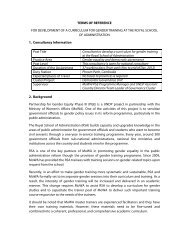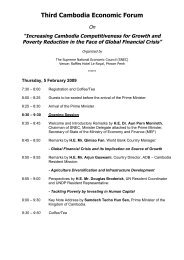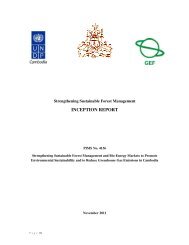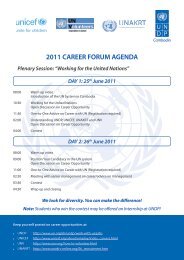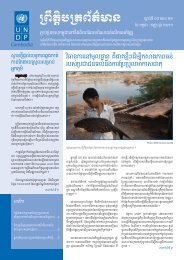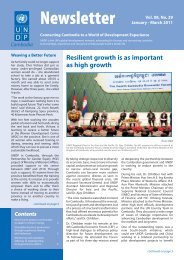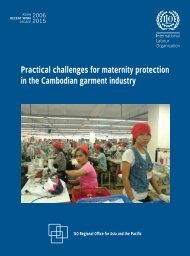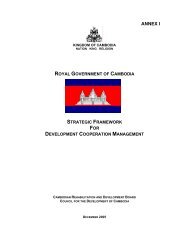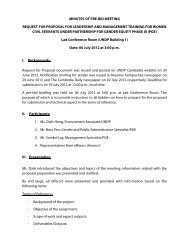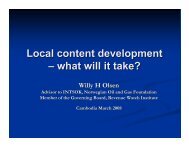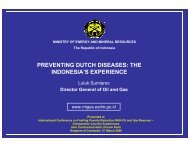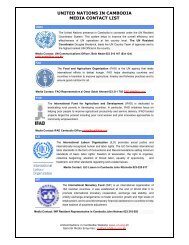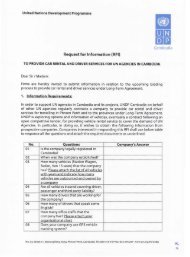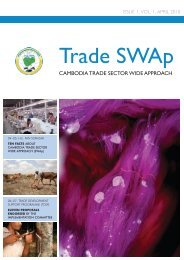UN Analysis Final.pdf - United Nations in Cambodia
UN Analysis Final.pdf - United Nations in Cambodia
UN Analysis Final.pdf - United Nations in Cambodia
Create successful ePaper yourself
Turn your PDF publications into a flip-book with our unique Google optimized e-Paper software.
that while awareness-rais<strong>in</strong>g efforts of locally based organizations, and the dissem<strong>in</strong>ation of public <strong>in</strong>formation<br />
on sexual and reproductive health, HIV and STI among young people have been significant achievements,<br />
they need to be expanded.<br />
It is most likely that many rural youths have limited access to <strong>in</strong>formation on reproductive health.<br />
Consequently, they may have <strong>in</strong>complete knowledge and understand<strong>in</strong>g of important issues such as<br />
sexuality, contraception and safe sex.<br />
PERCEPTIONS ABOUT MARRIAGE AND FAMILY PLANNING<br />
The majority of the young FGD participants knew that early marriage or pregnancy for women between<br />
15 and 18 can have health consequences for both mothers and children, and negatively impact upon<br />
employment opportunities. There was a range of op<strong>in</strong>ions on the appropriate age for marriage for young<br />
people. However, there was a general consensus that the ideal family size would be between two and three<br />
children. They reasoned that, with a fairly small household, parents have enough time to work to earn <strong>in</strong>come,<br />
while mothers and children can enjoy good health.<br />
GENDER AND CULTURE-RELATED ISSUES<br />
Historically, culture and tradition limited the amount of sex <strong>in</strong>formation provided to those who were not<br />
married, especially females. Elders felt that sex was not a topic fit for conversation; and if it was to be discussed<br />
at all, it was the role of parents.<br />
Slowly, traditional attitudes have shifted and there is now awareness that sex education is important for<br />
young people. Young unmarried people, especially girls, are allowed to talk more openly with<strong>in</strong> the family,<br />
and have the opportunity to participate <strong>in</strong> community meet<strong>in</strong>gs to discuss issues concern<strong>in</strong>g their health,<br />
such as sexual and reproductive health, family plann<strong>in</strong>g and abortion.<br />
Unlike our old generation, the young people <strong>in</strong> modern society have a lot of opportunities to learn about sex<br />
and reproductive health from many sources of <strong>in</strong>formation, such as school, TV and radio. More practically,<br />
some non-governmental organisations send their staff to educate people <strong>in</strong> the village, especially youth,<br />
about HIV/AIDS and sexual and reproductive health. Elders from previous generations heard mostly from their<br />
parents only. Sometimes because the household is very busy with farm or bus<strong>in</strong>ess activities, children <strong>in</strong> the<br />
household have no chance to learn about this... – FGD with mothers’ group, Sangker village, Svay Rieng<br />
KNOWLEDGE OF OTHER IMPACTS ON HEALTH<br />
In 2006, through its Reproductive Health Initiative for Youth <strong>in</strong> Asia (RHIYA) project, <strong>UN</strong>FPA-<strong>Cambodia</strong><br />
conducted a youth reproductive health survey that targeted 10-24 year-olds and posed several questions<br />
on knowledge and experiences related to illicit drug use. The survey found that awareness of prohibited<br />
drugs among young people was very high (over 90 per cent of males and females aged 10-14, and over<br />
98 per cent <strong>in</strong> the 15-24 age group).<br />
70 Situation <strong>Analysis</strong> of Youth <strong>in</strong> <strong>Cambodia</strong>



